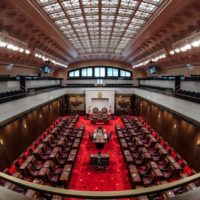News
2 government bills advance to Senate committees amid historic changes
"This reflects the spirit of cooperation which I hope can inspire the Senate to continue to advance the legislative agenda before us," says Senator Peter Harder.
Two government bills—one dealing with travel across the Canada-U.S. border and another that aligns Canada more closely with international statistical guidelines—are headed to committee for review on the heels of a historic agreement that gives Independent Senators new leadership roles.
Independent Senators, who make up the largest group in the Senate, will now receive a proportionate number of chairs in the Senate’s all-important committee system. The agreement, adopted in the Senate on Tuesday, comes after the expiration of a temporary order put in place last year to allow the growing number of Independent Senators membership on committees.
The new agreement also gives Senators from all groups in the Senate a proportional number of seats on committees.
A substantial amount of Senate work is done in committees, including proposed amendments to legislation. Committee chairs are responsible for presiding over meetings, guiding deliberations and ruling over procedural issues.
Senator Peter Harder, the Government Representative in the Senate, said the agreement is another step towards creating a Senate that is less partisan. He congratulated Independent Senators Group Facilitator Yuen Pau Woo, Senate Opposition Leader Larry Smith and Senate Liberal Leader Joseph Day for negotiating the agreement.
This reflects the spirit of cooperation which I hope can inspire the Senate to continue to advance the legislative agenda before us.
Prime Minister Justin Trudeau began nominating Independent Senators after the last election through a new arm’s-length selection process.
There are currently 44 Senators that are not part of a political caucus, including 39 that are part of the Independent Senators Group, the three members of the Government Representative Office, the Speaker of the Senate and one other Senator. Meanwhile, 35 Senators sit as Conservatives and 15 as Senate Liberals (whose members have not been linked to the national Liberal caucus since January 2014). There are currently 11 vacancies in the Senate.
Bills move to committee
Bill C-23 was adopted at second reading on Thursday and referred to the Senate Standing Committee on National Security and Defence for consideration.
- Read the sponsor’s speech on Bill C-23 at second reading in the Senate here.
- Read the response to the sponsor’s speech on Bill C-23 at second reading here.
The legislation would implement a 2015 agreement to further facilitate border preclearance—speeding the flow of people and goods across the Canada-U.S. border. Under preclearance, travellers don’t have to pass through customs in the U.S. because they’ve already done so before departing Canada.
Bill C-36 was adopted at second reading on Thursday and referred to the Senate Standing Committee on Social Affairs, Science and Technology for consideration.
- Read the sponsor’s speech on Bill C-36 at second reading in the Senate here.
- Read the response to the sponsor’s speech on Bill C-36 at second reading here.
The legislation aims to reinforce the independence, relevance and transparency of the national statistical system. Among the proposed changes, it would create a new Canadian Statistics Advisory Council, which would be responsible for providing advice on the overall quality of statistical information and publishing an annual report on the state of the system. The legislation would also eliminate jail time as a penalty for those who do not complete the census.
Find the full list of government bills currently before the Senate here.




















































